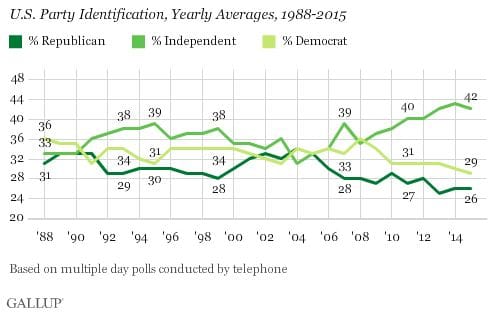Gallup: Major Party Identification Lingers Near Historic Lows

Gallup released the results of a new survey Monday which shows that the number of self-identifying Republicans and Democrats is stuck near historic lows. According to the results, over 4 in 10 Americans continue to self-identify as independent of the Republican and Democratic parties, leaving Democrats at 29 percent and Republicans at 26 percent of the voting population.

As Gallup reports, since the national polling group started the survey in 1988 there have been periods when independents have outnumbered Republicans and Democrats, but the gap remained relatively small. However, the percentage of independent respondents hit 40 percent in 2011, hasn't dropped below that since, and the gap between self-identifying independents and members of the two major parties has never been wider.
From Gallup:
most frequently mentioned problemfavorable ratings of each party
While some columnists focus specifically on the data that shows which party independents say they lean more toward as evidence that the independent voter is for the most part a myth, these commenters fail to address the fact that a) the pollsters explicitly ask respondents to say which party they identify with more (which doesn't necessarily indicate closet partisanship), and b) the entire system (including how pollsters ask these questions) is biased toward a two-party structure.
In fact, evidence previously obtained by IVN shows that not only are independents not a myth, but voters are choosing to register independent of the two major parties in greater numbers -- even in states with closed primary elections, where they cannot participate in the first round of the public election process unless they register as a member of a political party.
Photo Credit: Joe Belanger / shutterstock.com


